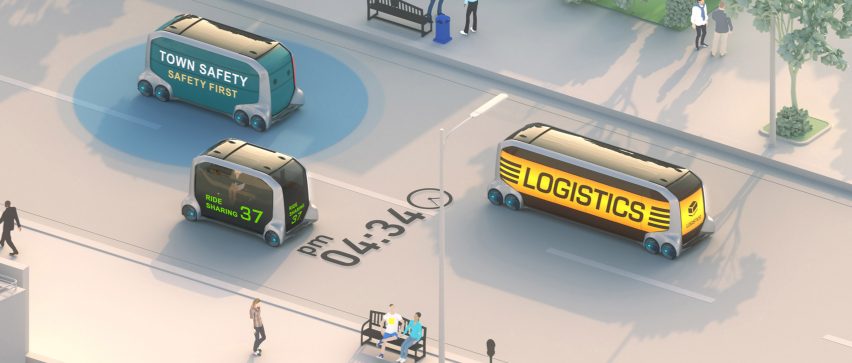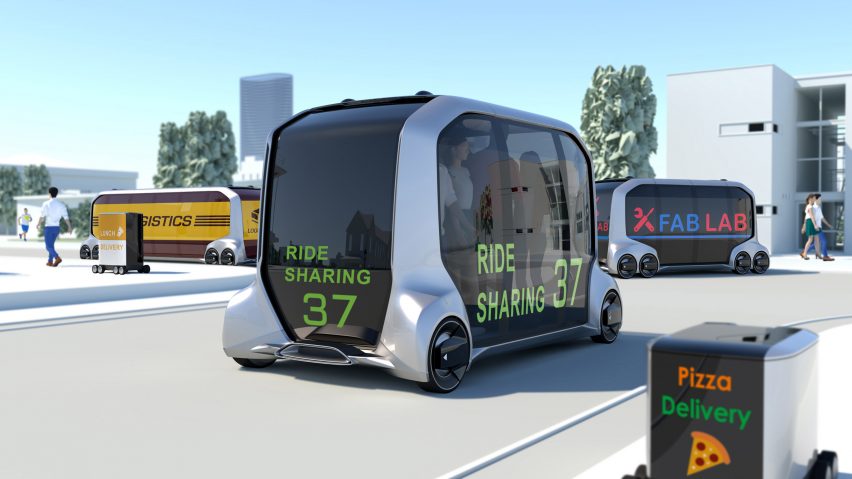Toyota reveals vision for driverless vehicles that switch function on demand
Car company Toyota has unveiled an autonomous, fully electric concept vehicle that could function as a communal taxi, delivery truck or mobile shop, depending on the time of day.
The e-Palette prototype made its debut at the Consumer Electronics Show (CES) in Las Vegas yesterday, presented by Toyota president Akio Toyoda.
The company aims to create a network of the pod-like vehicles, overhauling current mobility systems by offering a service that accommodates the needs of passengers, businesses and logistics operations.
"The automobile industry is clearly amidst its most dramatic period of change, as technologies like electrification, connected and automated driving are making significant progress," said Toyoda.
"Toyota remains committed to making ever better cars," he continued. "Just as important, we are developing mobility solutions to help everyone enjoy their lives, and we are doing our part to create an ever-better society for the next 100 years and beyond."

Designed for a wide range of uses, the automated cuboid volume has wheels at each corner of the low flat floor, freeing up as much space as possible on the inside and offering maximum flexibility.
The vehicles could be produced in three sizes, between four and seven metres in length, to accommodate different amounts of cargo. Companies could customise the interiors to their requirements, and update the digital exterior panels with their branding.
Alternatively, the pods could remain flexible and serve multiple purposes throughout the day, simply updating their digital displays to reflect current use.
These e-Palettes might act as ride-sharing vehicles during rush hour, work as delivery vehicles later that morning, offer a hospital shuttle service through the afternoon then return to taxi duties as people leave work.
Working as a fleet, they could automatically deliver goods from a central distribution centre, using facial-recognition technology to confirm pickup by the correct recipient on arrival.

Other suggestions include use as mobile retail stores, which could travel to shoppers so they could try on items selected online before buying, or as moving hotel rooms that would allow guests to go to bed in one location and wake up in another.
At yesterday's launch, Toyoda also announced a business alliance that would work together to develop the e-Palette networks. Companies including Amazon, DiDi, Mazda, Pizza Hut and Uber have all signed on.
The vehicles could either run on Toyota autonomous driving software, or be installed with another company's self-driving system. Either way, Toyota's Guardian technology will "act as a safety net to help ensure appropriate operation".
Feasibility testing for the e-Palette system in regions worldwide is planned for the early 2020s, while some may be used during the Tokyo 2020 Olympic and Paralympics Games.
"This announcement marks a major step forward in our evolution towards sustainable mobility, demonstrating our continued expansion beyond traditional cars and trucks to the creation of new values including services for customers," Toyoda said.
Also at CES, which runs until 12 January 2018, Nissan is presenting technology that allows vehicles to read the brain activity of drivers, and initiate movement in response.
Before the fair started yesterday, analysts also shared their tech predictions for the coming year, which include virtual hangout spaces, biometric security and robotic companions.